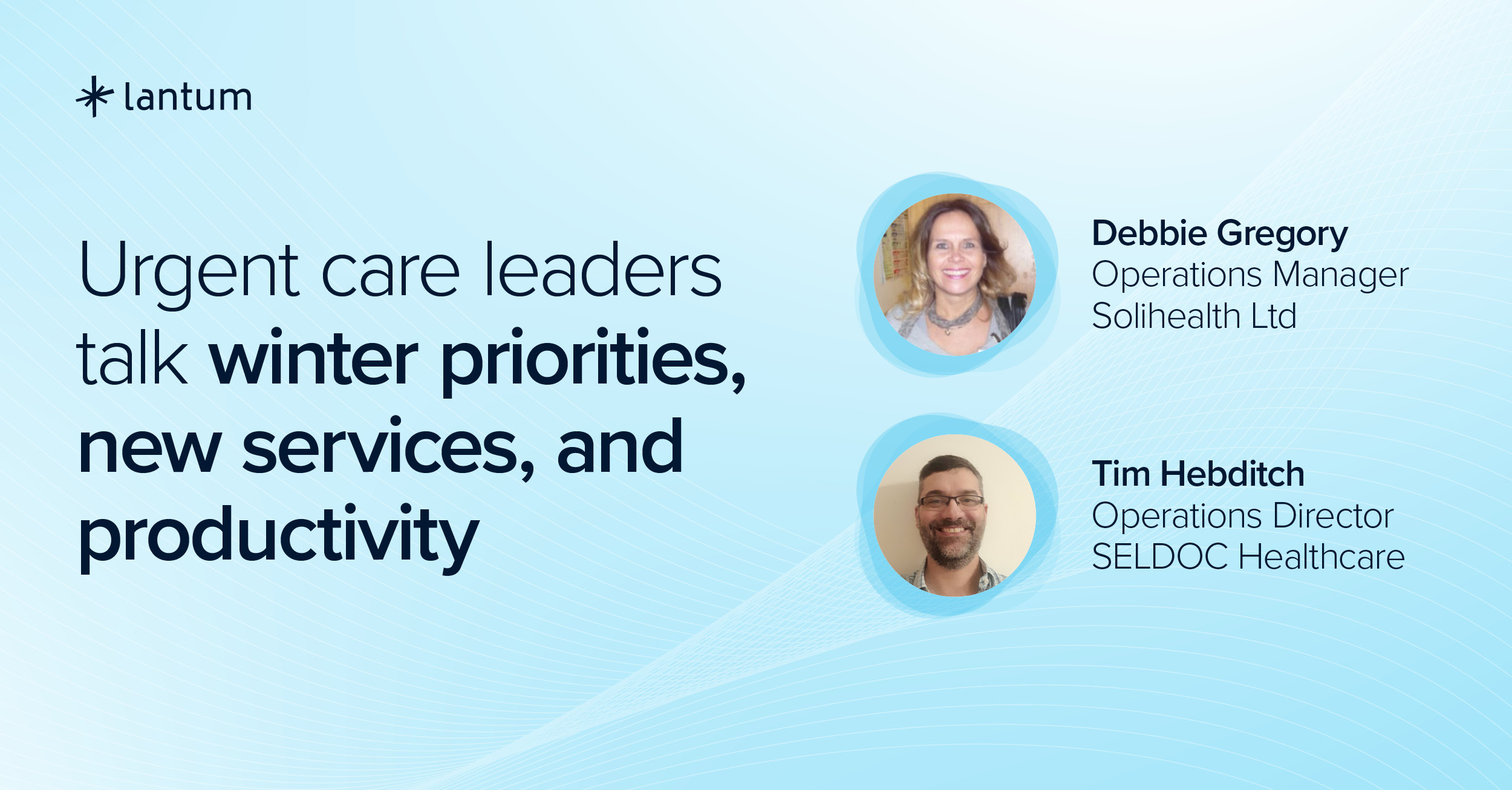Workforce Planning, Winter Pressures, Urgent Care
Urgent care leaders talk winter priorities, new services, and productivity
In the run up to an unpredictable winter, one thing in the NHS is certain: Every urgent care organisation is facing similar challenges. So as you prepare for the months ahead, hearing from others in the same position could help.
In a recent webinar we spoke to Tim Hebditch, Operations Director at SELDOC, and Debbie Gregory, Operations Director, and Sarah Baker, Operations Coordinator, from Solihealth Ltd about what they’re doing to get their services set for winter.
From funding challenges to partnerships, discover five things they’re thinking about that could inform your planning.
1. Familiar challenges and new opportunities
As always, this winter SELDOC and Solihealth are expecting challenges like:
- Short notice sickness from staff
- Potential outbreaks
- Higher demand
- Reduced and unpredictable funding
To tackle these, Tim and Debbie are focusing on:
- Leveraging a better understanding of post-COVID-19 normal. Unlike the blank sheet of last year, Tim explained, at SELDOC they’re already seeing that demand is mirroring the peaks and troughs of last year – and that extra knowledge is helping them to prepare.
- Engaging commissioners early. Getting buy-in on potential plans for winter pressures means you have more time to iron out the details and create backup plans in case funding falls through.
- Refining reporting and forecasts. As the season progresses, you can continue to analyse demand and update projections so you can respond in the best way .
As Tim said, “When finances are restrained, you have to make efficient use of the resources you have”. But it’s also important to look out for staff wellbeing.
Some recommended productivity strategies include:
- RAG ratings to understand performance and open communication with clinicians to see how you could streamline your service
- Giving clinicians ownership of an appointment book so they have more freedom and autonomy to run the workload
- Linking pay to productivity. In a CAS service validating ambulance requests, Tim explained they saw a 50% increase in productivity after introducing performance-based pay instead of a flat rate.
To make sure you’re looking after clinicians and protecting quality for patients too, Debbie and Tim suggested:
- Encouraging feedback from your team and patients
- Sense-checking your goals with locums based on their experiences at other organisations
- Benchmarking performance with other providers
- Looking at aggregated data (e.g. a full day or week of performance, instead of individual appointments) so you’re getting an accurate and fair picture
Throughout the webinar, Debbie and Tim described how new partnerships – with hospitals, ICBs, PCNs and local councils – benefit both primary and secondary care by relieving pressure and improving services for patients. SELDOC have successfully launched an OOH palliative care service, and Solihealth are soon piloting a new acute care pathway.
Debbie said: “At this scale of reacting and trying to deliver efficiencies, you can only do it if you’re working collectively.” To spot opportunities for new partnership services:
- Network and make sure you’re in the right places and have a voice in conversations with the UHB and ICB
- Take proactive steps to understand demand and blockers across your network, and how you could collaborate to solve them
- Establish KPIs and reporting metrics upfront so everyone can measure success and demonstrate value
- Keep communication open so you’re aware of changes at partner organisations and are prepared for any knock-on effects
- Don’t be afraid of technical challenges. Integrating systems can be difficult but as Sarah at Solihealth demonstrated, it’s possible to make it work.
4. Ways to bolster existing services
During the webinar, both Debbie and Tim described how they’re hoping to bolster existing services this year. Some opportunities they’re considering are:
- Maximising the scope of activities staff can do by providing additional training
- Creating efficiencies in deployment, e.g. using APs instead of GPs
- Seconding staff or empowering them to multi-task across services
- Looking at the risks and opportunities that expiring contracts may present
5. Year-round strategies for preparing for winter staffing
Successful winter staffing starts long before the temperature drops. During the webinar, we heard about the year-round efforts that go into making sure services run as efficiently as effectively as possible:
- Build relationships with temporary staff so you have a pool of trusted clinicians you can count on in winter.
- Run a year-round clinician recruitment programme so you can do it thoughtfully and effectively and find the right people.
- Review your induction process to create the right expectations with clinicians and build a productive and pragmatic relationship.
- Put a temporary staffing option in place. Debbie spoke about using a solution like Lantum for sessional GPs when you need them.
- Get an extra pair of hands. Lantum’s Managed Service for urgent care gives you hands-on help to relieve the pressure and fill shift gaps – even at short notice.
Using these measures year-round helps make savings on staffing in quieter months, so you have the extra budget through winter crunch points.
Find out more about Lantum's Managed Service for urgent care, or watch the full webinar to hear more about specific initiatives the two organisations are working on.


